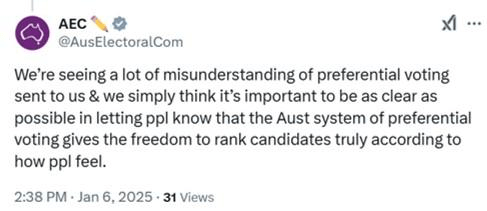Tony Abbott recently warned us that ‘conservatives must resist [the] tyranny of officialdom’.
This proved timely, as I’ve just experienced unelected and anonymous bureaucrats at the Australian Electoral Commission (AEC) publicly endorsing the view that my political opinion constituted ‘disinformation’.
Given the government’s recent attempts to empower unelected officials to declare opinion as misinformation or disinformation, this should be cause for concern for all Australian voters in the lead-up to an election likely to be close.
In a recent article, I argued there is a historical rule that the Coalition wins government when it scores more than 41 per cent of the primary vote and scores more primary votes than Labor plus the Greens. For conservative voters intent on electing the Coalition, I therefore opined that they should not rely on their preference votes to oust the current Labor government.
Some disagreed with my analysis, expressing their views on X (formerly Twitter). This is entirely their right in a liberal democracy, but to disagree with my opinion does not mean that what I wrote amounts to ‘disinformation’.
One punter tweeted that my opinion was peddling ‘preferential voting disinfo’, and tagged the AEC. The AEC appeared to thank my critic and endorsed his claim of disinformation.

I am a political scientist by profession.
I regularly engage with colleagues on the analysis and meaning of political events and causes. I therefore don’t care what pundits say about my opinions on social media, but when those opinions are labelled as ‘disinformation’ by an official body such as the AEC – that’s quite another story.
To suggest that I had engaged in ‘disinfo[rmation]’ could be interpreted as alleging that I had done so with the intent of deceiving others as to my opinion.
The AEC’s definition of disinformation is:
‘…knowingly false information designed to deliberately mislead and influence public opinion or obscure the truth for malicious or deceptive purposes.’
In the spirit of fairness and open debate when I pointed out their error, the AEC publicly responded:

Having failed to secure a correction in the forum of public debate in which the exchange took place, I complained to the AEC. I pointed out that my article was written for a conservative audience and was aimed at those who did not want to see the current Labor government re-elected. It is my opinion based on historical trends, not an educational piece to help the AEC explain the voting system to a general audience.
In response, the AEC refused to delete the tweet and wrote the following:
‘While an elector may indeed wish to consider whether directing their first preference vote to a candidate other than one for the party they wish to form government risks that candidate being excluded during the distribution of preferences, it is misleading to suggest this will seriously threaten the ability of Coalition candidates to win.’
While the AEC changed its description of my analysis from ‘disinfo[rmation]’ to ‘misleading’, I did not write as the AEC now justified their declaration. I wrote that Menzies’ legacy was to unite conservatives, and voters risked allowing Labor to win by splintering the conservative vote as had happened pre-1946.
This brings me to the claim against me of disinformation, which is what the AEC endorsed in their first tweet. It is absolutely possible to preference another candidate without ensuring Labor forms government. But I didn’t say it wasn’t. I suggested it was a risky strategy if you don’t want a Labor government.
This is not disinformation, it is an observation of history.
A label like disinformation has a particularly sinister implication given recent attempts by this federal Labor government to empower unelected bureaucrats to declare information to be misinformation and disinformation.
Thankfully, the draft legislation was defeated in the Senate, although the Communications Minister, Michelle Rowland, has recently flagged the need for assurance in response to Facebook’s announcement that it intends to cease fact-checking and pulling down posts.
The tyranny of officialdom is, in my opinion, evident in the behaviour of unelected bureaucrats at the AEC in response to my article. Not only have I arguably been defamed, but my political opinion urging voters not to give their first preferences to parties other than the Coalition has been inaccurately labelled as ‘disinfo[mation]’.
Had the Misinformation and Disinformation Bill gone ahead, such reflexive, inaccurate and imprecise endorsement of the term ‘disinfo[rmation]’ of my views may well have grounded the legislation’s operation and could have threatened my liberty or otherwise statutorily silenced me. All free-thinking citizens ought to be alarmed at this prospect, especially at the hands of officials at the AEC responsible for the integrity of Australia’s voting system.
But even without the bill, it is concerning that the AEC can endorse the labelling of my opinion as ‘disinfo[rmation]’ when they were unable to establish this view in either their tweets or their response to my complaint other than to say the situation I described as splintering the conservative vote meant that it was still ‘highly likely it wouldn’t diminish ability to potentially win the seat’.
Indeed, in the AEC’s own words, the possibilities ‘have not yet been fully borne out in history’. This hardly meets the expected definition of ‘disinformation’, namely an intention to deceive others with the dissemination of incorrect information.
Who knew their role was to actively police political opinions?
My personal experience with the AEC therefore bears contemporaneous example of what Tony Abbott warned us about the ‘tyranny of officialdom’.
But as the Misinformation and Disinformation Bill failed, let me leave you with this opinion in the meantime. If conservative voters are half-hearted about voting for Coalition candidates to teach them a lesson, then they should do it from the inside and not risk the cascading flow of preferential voting in Australia. But if you want to squander your first preference vote and risk another three years of Labor, then fill your boots.
Dr Michael de Percy @FlaneurPolitiq is a political scientist and political commentator. He is a Fellow of the Royal Society of Arts, a Chartered Fellow of the Chartered Institute of Logistics and Transport (CILTA), and a Member of the Royal Society of NSW. He is Managing Editor of the Journal of Telecommunications and the Digital Economy, Chairman of the ACT and Southern NSW Chapter of CILTA, and a member of the Australian Nuclear Association. Michael is a graduate of the Royal Military College, Duntroon and was appointed to the College of Experts at the Australian Research Council in 2022. All opinions in this article are the author’s own and are not intended to reflect the views of any other person or organisation.


























